I just read a thought-provoking social media post on all the benefits of “Euro-nymphing.” For those of you who haven’t heard about the technique, it’s a style of tight-line nymph fishing that utilizes long, color-coded leaders and weighted flies, and that’s extremely popular with tournament anglers in Europe and elsewhere.
Fly fishers usually fall into two different camps with regard to European-style nymph fishing. Anglers who prioritize results — in other words, folks who want to hook as many fish as possible — tend to embrace it. Which makes sense, as it’s an effective alternative to more traditional styles of fly fishing.
At the same time, anglers who are less interested in numbers and more focused on the overall quality of the experience don’t seem to gravitate to the tactic. Since you can Euro-nymph without a fly line — monofilament works equally well when you’re lobbing weighted nymphs a short distance — and since you don’t really “cast” when you’re using the technique, it doesn’t always feel like fly fishing.
On a personal note, I tend to fall into the second category. I love to cast my fly rods — as I’ve stated any number of times over the years, casting is the true essence of our sport — and any technique that makes fly lines and fly casting optional is going to be way, way down on my list of preferred options.
When I finally finished reading the afore-mentioned social media post on Euro-nymphing, as well as the dozens of follow-up comments, I couldn’t help but reflect on the fact that different anglers have different priorities, and that those priorities invariably impact the way we fish.
I’m a firm believer that there’s one overarching reason to choose fly fishing over the alternatives, and that’s because it’s more fun and more enjoyable. There are easier ways to catch fish, of course — bait fishing and spin fishing both come to mind — and it’s obvious that those other methods don’t require as much skill, or as much perseverance, or as much of a financial investment. If we want to be frank, we should acknowledge that most of us prefer fly fishing in spite of the fact it’s not the most efficient way to spend our time on the water.
In light of that reality, it makes sense to consider where our priorities reside and then decide how we can wring the most enjoyment from our fishing.
I’ve been fortunate to spend time with some truly incredible anglers over the years and most of them know exactly what they’re looking for when they pull on their waders and grab their rods. Sometimes it’s all about solitude. An awful lot of us use fly fishing to escape from the hustle & bustle that infuses our daily lives. When we wade into a pristine trout stream, or paddle across a remote lake, or stalk a vast saltwater flat, we experience a much-needed respite from the overwhelming cacophony of modern existence. Nature in the raw is a balm for the soul, while solitude in nature is as sure a path to sanity and good health as any of us are likely to find.
Of course, there are also times when our fishing is more about companionship. We’re a social species, we humans, and the simple act of sharing time on the water has a deep and sometimes profound impact on our psyche. When we fish with friends or family, the world around us comes into clearer focus and we have the option of sharing our thoughts and visions, as well as our passion for nature, with people we truly like and respect. There are very few things more enjoyable than spending a day fishing with family or friends — and I’m definitely not the only one who feels that way.
Then there’s the inherent excitement of our sport. Some of us are drawn to the act of living life out on the ragged edge, whether that means targeting unusual species in exotic locations, or wading deep in fast water, or floating a stretch of river that others deem too dangerous, or fishing with one eye on the brown bear wandering down the far bank. A spike of angling-related adrenaline invariably makes us feel more alive, while the excitement that infuses our sport helps banish the mundane and recharge our mental and emotional batteries.
There’s also beauty. I know a number of anglers who find that the eye-catching splendor of the natural world exceeds even the finest in art, or literature, or music. Sometimes it’s a sky painted with colors beyond description. Other times it’s a jagged mountain range defining a distant horizon, or a copse of aspen outfitted in autumn gold, or a handsome bull elk in a verdant meadow, or a doe drinking from the river while the mist glitters in the morning’s first sunlight. Sometimes it’s a bald eagle soaring by on the lightest of afternoon zephyrs, or the artist’s palate gracing the gentle curve of the trout we’ve just brought to hand. Whatever form it happens to take, it’s hard to argue with Ralph Waldo Emerson, who wrote: “To the dull mind nature is leaden. To the illumined mind the whole world burns and sparkles with light.”
And finally, there’s the act of fishing itself. Fly casting, done well, can help us slip into an actual moving meditation. Add bird song, and fresh air, and sunshine, along with the experience of standing thigh-deep in clean, life-giving water, and our angling can border on the sublime.
Since I’m often in search of balance in my life, I invariably try to hit as many of those high notes as I possibly can. Sometimes beauty and solitude are the day’s highlights. Other times it’s excitement and companionship. There are also times when it’s simply the sensation of wading deep and finding the perfect rhythm for my casting. Regardless, I’m almost always looking for something besides the trout I love to target. As Henry David Thoreau put it, "Many men go fishing all of their lives without knowing that it is not fish they are after.”
Which brings us full circle to Euro-nymphing. Is it something you should explore? Frankly, I can’t answer that question. But if you look inside and then ask yourself what it is about your angling that really makes you smile, the answer shouldn’t be too hard to ascertain.

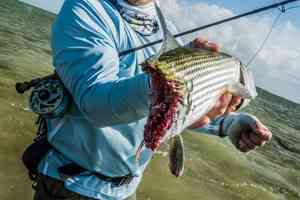


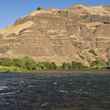
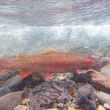
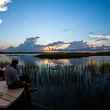






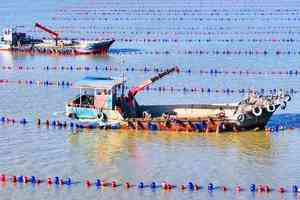
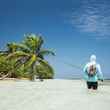

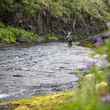




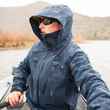




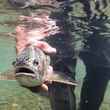
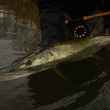

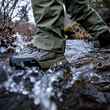
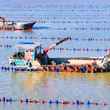
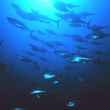
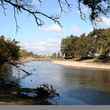
Comments
Jon replied on Permalink
Your thinking follows my thinking very closely. One thing I've never liked about nymphing with a bobber is that you don't feel the "hook up," that tingling of the reptile brain which for me is a big part of catching. Versus fishing, the many aspects of which you defined beautifully.
When we were in Fernie, we hired a guide and said "we don't nymph." He said "good." But then told us he had guided the world champion "French" Nympher the day before. They guy caught 50 trout in 30m while the rest of the group was having lunch, in water the guide said he'd never considered fishing. (We actually passed them several times on the river, we had a double digit day so while this was impressive, we'd also caught fish so we were fine with it.)
Then a few years later I took my GF to Edinburgh on a business trip and we hired a guide to fish the River Tweed. At that time the only fish in the river were graylings and the only game for them was tight-line nymphing. Yes the cast sucks. No I couldn't see the leader until the guide hiked back to the truck and got me an orange leader. But YES I could feel the hook up. So, now I have a Euro rig, though I've yet to use it, for those prospecting moments when I just feel like there _should_ be fish there and I want to verify. (I built a 10' 4wt that I used alternately as a trout Spey, overhead, and now euro-nymph rod, so it's just adding another reel and line to the kit.) Will it ever be my go-to first response to make sure I catch fish? No. But, it did add grayling to my GF's life list, and it was a new skill to learn, and it sure beat some of the other lead-chucking "fly fishing" techniques I've tried. And, I didn't feel like I needed a shower and whipping myself with thorns to clear my soul after.
M replied on Permalink
*casting* not lobbing: https://troutbitten.com/2019/07/07/fly-fishing-the-mono-rig-its-casting-...
Tyler W replied on Permalink
"...and it’s obvious that those other methods don’t require as much skill, or as much perseverance,"
I love this. Nail yourself to the cross of fly fishing. Some people tell me I have to fly fish because it is so effective, other flyfishers say it is so hard you require special fly fishing designated waters that ban bait.
I'm an all around angler for every fish: from trout to bigmouth buffalo. Let's be honest, sometimes fly fishing IS the most effective method. And some fish literally won't eat feathers. Bait fishing for bigmouth buffalo or quillbacks is harder than fly fishing for trout.
You can say you enjoy water slapping without throwing in a dig at bait fishing.
Michael Hill replied on Permalink
I love this article and I identify with the point you're making. To me, fly fishing is NOT ABOUT THE NUMBERS but more about the experience of being out in nature. Granted, it's awesome if you're catching lots of fish but I've never had a bad day of fly fishing, even on those rare skunked days.
I mainly fish dries, but I can hold my own fishing sub surface. I learned how to "high stick" years ago without using a bobber, err... indicator. But as you stated, casting is an integral part of the skill needed to be a proficient fly fisherman and I enjoy being able to present a dry to a rising Brookie and see the resulting explosion!
Since the pandemic started, I've noticed more people getting into fly fishing. There's been an explosion of You Tube channels about our sport with emphasis on numbers of fish caught. People who are ignorant in proper C&R techniques are revealing some of the sacred places that should be preserved, catching large numbers of fish with little respect to preserving the species, and bragging about their catches. Then they have the gall to beg you to "like and subscribe to my channel". How pathetic is that? (Sorry for the rant but it's upsetting to see the lack of concern.)
Regarding Euro nymphing, I agree that it's all about the numbers. By focusing on numbers you miss out on the experience of being in nature.
I fly fish for the solitude and to commune with my Creator. There's so much beauty surrounding us but lots of people miss that because they don't lift up their eyes to take it in.
Case in point, my favorite experience involved a 12 point buck that wandered out from the Rhodos about 50 yards upstream from me. I was changing flies when I first noticed him and immediately stopped and remained dead still. He didn't notice me and started drinking from the creek. I had never been this close to one in the wild and I was in complete awe of what a magnificent specimen he was! After about a minute he froze, raised his head, and turned to look at me. I could feel my heart pounding so hard I could almost hear it! We held eye contact for what seemed like an eternity but was most likely less than 30 seconds. I expected him to bolt, but he resumed quenching his thirst and made his way across the creek without showing any concern for me. The whole experience lasted about 3 minutes. This happened almost 30 years ago but I remember it like it was yesterday...
My intention is not to condemn anyone for their choice of methods. My concern is that with more people fishing, more emphasis should be placed on conservation and enjoying this beautiful world we live on...
Jim replied on Permalink
I concur with those things that bring enjoyment to your fly fishing. I would add knowledge, about the fish, it’s preferences for habitat and food, and how the environment interacts with these traits. As a professor I taught and did research on animal behavior. Trying to figure out a animals with a brain the size of a pencil eraser is humbling.
Kerry Gubits replied on Permalink
Terrific little piece about the essence(s) of fly fishing. Just as an aside, I was once guided by a member of the USA fly fishing team. Worst guiding experience of my life. The guy was a complete jerk, and worse, grabbed my line while we were chasing a Salmon River steelhead, and broke him off. But boy, I’ll bet he could land a lot of fish in his tournaments. At least, that’s what he told me.
Joe Lehosky replied on Permalink
After reading this, I later read and article in Pennsylvania OutdoorNews entitled "Suddenly Slack Line, It's Why You Go" by Ben Moyer. The point of the article was sometimes you hook that impossible fish, or a fish in an impossible place. Even though you do not land that fish, still you return to try again because the thrill of that impossible fish never leaves your thoughts.
Last week I was euro-nymphing, as is my norm. The line stopped. I set the hook gently as is usual with 2wt rod and 6x tippet. Nothing happens. Darn, a snag. I shortened the leader outside the rod so the tip was over the snag and started to bounce the rod tip to try to dislodge the fly. After the fifth or sixth bounce, I finally pissed off the huge rainbow and he moved slowly up and across the current. Then it was chaos. Left, right, up out of the water, downstream, upstream, tail dancing, downstream, line went slack. Can't wait to go back.
Which brings me to why I euro-nymph. Yes, I catch more fish. More importantly, I catch more bigger fish. I still have the same nature experience and satisfaction of perfecting technique. Leave the rocks in the creek.
Dennis replied on Permalink
But you're not fly fishing.
You're using the light weight tackle to get a bigger rush when you hook up. The same could be accomplished by putting a spin cast reel on your flyrod which is what I did as a kid when trout or crappie fishing.
Joe replied on Permalink
Dennis, you forgot. I said leave the rocks in the creek.
Glenn Dotter replied on Permalink
60 years ago as a boy, fishing was about catching my limit to contribute to the family table. I eurowormed with a bamboo flyrod. High sticking that worm was the best way to detect the strike.
A couple years later as a teenager Dick Rader tied 3 wet flis on my line and taught me how to swing them and I caught my limit so much faster I was hooked.
Slowly, after many double and even a triple, I started putting fish back so I could stay on the water longer. As I aged, I took fewer and fewer trout home but caught more and more. I also began to realize I was enjoying the things around me and remembering something my dad told me once while sitting for squirrels. Watching ants work feverishly moving back and forth, he "look how hard they work just trying to get through. If you look, you will see amazing things."
Flyfishing has become an amazing event and while I catch all the fish I want and have been tying flies for 40 years, it is the experience that matters most. Sitting on the bank with my buddy, sharing a cigar and swapping storie while looking around is far more important than all the fish we catch, yet we both keep track of how many we catch. It is fun and life should be fun and amazing. As Thoreau said, it's not the fish!
Kirk Nichols replied on Permalink
I am happy to let you know that one can enjoy Euro-nymphing as part of the “overall quality of the experience”. I can cast and enjoy weighted nymphs with as much awareness of the liquid world around me as when I toss hand-tied dry flies on any of my bamboo rods, or streamers on graphite rods, or soft-hackle on a 3-weight glass rod. The longer I fish moving water (over six decades), the more the accumulating collection of motions blend together into one beautiful experience of poetry with a rod and a line, a river and a current, and fish.
August Gresens replied on Permalink
This article is similar to the previous post about the 'soul' of fishing be lost. Both articles seem to me to be written by folks that have a hard time accepting change.
The reality is that things are always changing. So instead of worrying about how other people fish - go fishing the way you want and enjoy yourself! In the end you only have so many days on this earth to do so.
Guy replied on Permalink
"and it’s obvious that those other methods don’t require as much skill, or as much perseverance" is like saying that playing musical instrument A is harder than musical instrument B. Don't you think the truth is that there is an infinite amount of improvement that can be made attempting to perfect your use of with any tool?
Also, the same roughly dozen guys finish in the top ten of the top pro bass tourneys throughout the year. It is hard to believe that doing so requires less skill than other types of fishing does. They have developed the skill to routinely crush everybody else in that non-niche type of fishing.
I tightline nymph using a (queue the hatred) tenkara rod about half the time and fish streamers, dries, and light wets on a 3 or 5 weight the the other half of the time. It's all fun and neither technique renders all of the other great stuff you point out about getting out and fly fishing moot.
KEB replied on Permalink
I enjoyed reading this take but still plan to take up contact nymphing this season. I, too, mostly fish to be out where trout live and to experience the sights and sounds you can only experience on pristine flowing water. Counting, weighing and measuring the catch hasn't been part of my thing since the 2nd of my 45 seasons. Turning flyfishing into a competitive bass tournament sounds like starting a war for world peace to me.. That won't change just because I'm fishing with 20' of nylon level line ahead of my fly, rather than 12' of tapered nylon line.
I spent many a day before the advent of the Thingamabobber tight line nymphing between emergences and never beat myself up about it. No one saw fit to compare that technique to spin fishing, either. As I view it, modern contact nymphing is just a refinement of a style that's been around forever (thank you again, Charlie Brooks) and is no more prone to turn us into numbers fishermen than any other. After 45 yrs on the water, and now retired to fish whenever I please, the idea of keeping it fresh by learning something new-ish sounds pretty good to me
The biggest attraction to me of this is that it feels like I'm closer to where the trout live out their lives and eat most of their meals. Learning and relearning about the life cycles of the bugs and tying flies to try to imitate them has always been the best part of being a flyfisher during these months between seasons and diving into this style of fishing has rekindled some of that enjoyment for me.
So, I hope we can stick to the "different strokes" theme and avoid the judgmental questions about whether this technique or that one is 'really flyfishing.' Until we're all limiting ourselves to only casting dry flies upstream to rising fish, anyway.
Pages